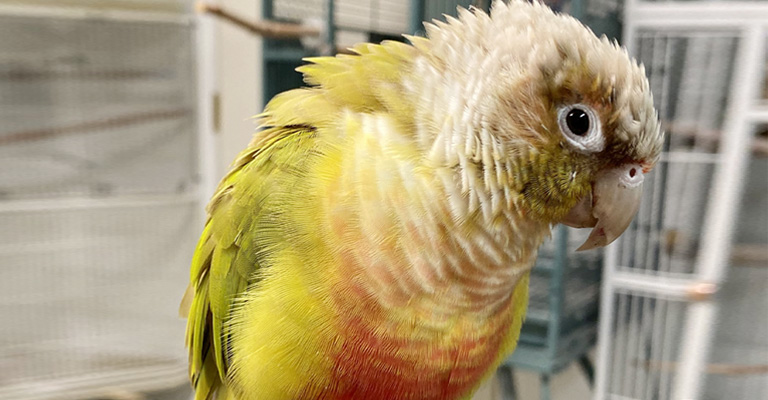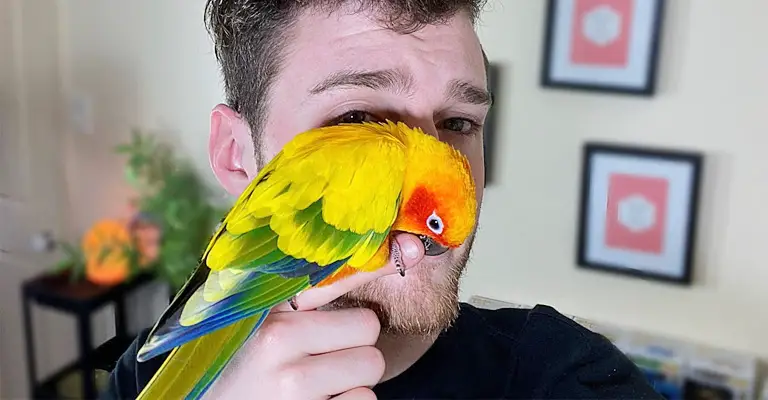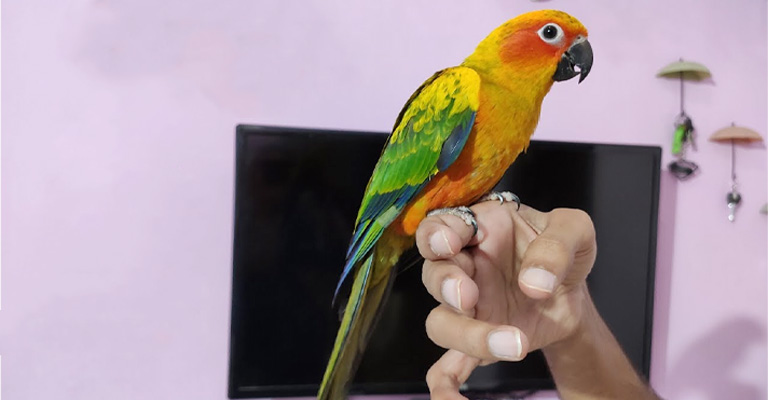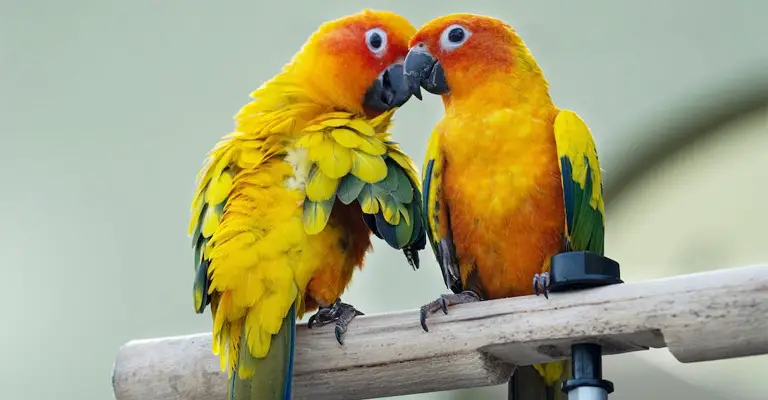Sun Conures are vibrant and sociable parrots known for their stunning plumage and lively personalities, making them a popular choice among bird enthusiasts.
If you’re considering bringing one into your home or already have a feathered friend, understanding their lifespan is essential for providing the best care and companionship.
In this comprehensive guide, we’ll delve into the question ‘How long do sun conures live?’. From diet and environment to social interaction, we’ll explore the key elements that can impact the longevity of these charming birds.
Whether you’re a prospective Sun Conure owner or an experienced avian enthusiast, this information will equip you with the knowledge needed to ensure your Sun Conure enjoys a vibrant and fulfilling life by your side. Stay focused.

How Long Do Sun Conures Live?
Sun Conures (Aratinga solstitialis) have a lifespan of approximately 15 to 25 years in captivity when provided with proper care. However, their longevity can vary depending on factors such as diet, environment, and overall health.
To ensure a Sun Conure lives a long and healthy life, it’s essential to provide a balanced diet consisting of high-quality pellets, fresh fruits, and vegetables. A spacious cage with plenty of mental and physical stimulation is also crucial.
Regular veterinary check-ups can help detect and address any health issues early, further extending their lifespan.
In the wild, Sun Conures may have a shorter lifespan due to natural predators and environmental factors. However, in well-maintained captivity, they can thrive for several decades, making them a long-term commitment for pet owners.
Factors Influencing Sun Conure Lifespan

The lifespan of Sun Conures can be influenced by several factors, including:
Diet
A balanced diet with high-quality pellets, fresh fruits, and vegetables is crucial for their health and longevity. Poor nutrition can lead to various health problems that can shorten their lifespan.
Habitat
Providing a spacious and stimulating environment is essential. A cramped or boring cage can lead to stress and behavioral issues that may impact their overall health and lifespan.
Social Interaction
Sun Conures are highly social birds. They thrive on interaction with their human caregivers and other birds. Lack of socialization and mental stimulation can lead to loneliness and depression, affecting their lifespan.
Healthcare
Regular check-ups with an avian veterinarian are essential to detect and treat health issues early. Neglecting healthcare can lead to the progression of diseases and a shorter lifespan.
Exercise
Sun Conures needs ample opportunities for exercise to maintain physical health. Lack of exercise can lead to obesity and related health problems, reducing their lifespan.
Toxic Substances
Exposure to toxic fumes, chemicals, or unsafe toys/materials can be fatal. Keeping their environment safe is crucial.
Genetics
Individual genetic factors can also play a role in their lifespan. Some birds may be more predisposed to certain health conditions than others.
Stress Levels
High levels of stress, whether due to environmental factors or improper handling, can negatively impact their health and longevity.
Disease Prevention
Proper hygiene and disease prevention measures, such as quarantine for new birds, are important to avoid the introduction of diseases that can reduce their lifespan.
Breeding History
Birds that have been bred responsibly and come from healthy genetic lines tend to have a better chance at a longer lifespan.
By addressing these factors and providing optimal care, Sun Conure owners can help ensure their birds live a long and healthy life.
Tips for Extending Your Sun Conure’s Lifespan

Extending your Sun Conure’s lifespan requires dedicated care and attention to their physical and emotional needs. Here are some essential tips to help ensure your Sun Conure lives a long and healthy life:
Balanced Diet
Provide a well-balanced diet consisting of high-quality pellets, fresh fruits, and vegetables. Avoid giving them foods that are high in sugar, salt, or processed ingredients.
Hydration
Ensure your Sun Conure has access to clean, fresh water at all times.
Exercise
Encourage physical activity by providing a spacious cage with plenty of toys and perches. Allow them to fly within a safe, bird-proofed room when possible.
Mental Stimulation
Keep your Sun Conure mentally engaged with toys, puzzles, and regular interaction with you and other birds if possible.
Social Interaction
Sun Conures are highly social birds. Spend quality time with your bird daily to prevent loneliness and boredom.
Regular Veterinary Care
Schedule regular check-ups with an avian veterinarian to monitor your bird’s health, catch potential issues early, and keep vaccinations up-to-date.
Safe Environment
Ensure their living space is free from hazards such as toxic plants, chemicals, and other dangers. Bird-proof your home to prevent accidents.
Proper Handling
Handle your Sun Conure gently and avoid stressful situations. Rough handling can lead to fear and anxiety.
Quarantine New Birds
If you introduce a new bird to your home, quarantine them for a few weeks to prevent the spread of potential diseases to your existing bird.
Temperature Control
Keep your Sun Conure in a temperature-controlled environment. Avoid exposing them to extreme heat or cold.
Grooming
Maintain your bird’s beak, nails, and feathers as needed. Consult your veterinarian or an experienced bird groomer for guidance.
Monitor for Signs of Illness
Be vigilant for any changes in behavior, appetite, or physical appearance. Early detection and treatment of illness are crucial.
Proper Sleep
Ensure your Sun Conure gets enough rest by providing a quiet, dark, and comfortable sleeping area.
Variety in Diet
Offer a variety of foods to prevent dietary deficiencies. This can include different types of fruits, vegetables, and occasional treats (in moderation).
Reduce Stress
Minimize stressors such as loud noises, sudden movements, or changes in routine that can distress your bird.
Avoid Smoking
Keep your home smoke-free, as exposure to tobacco smoke can be harmful to birds.
Love and Affection
Show your Sun Conure love and affection regularly to build a strong bond and emotional well-being.
By following these tips and maintaining a consistent and attentive care routine, you can significantly increase the chances of extending your Sun Conure’s lifespan and ensuring a happy and healthy life for your feathered friend.
What Type of Diet Can Increase Sun Conure’s Lifespan?

A well-balanced and nutritious diet is essential for increasing a Sun Conure’s lifespan. Here’s a breakdown of the types of foods that can contribute to their long-term health:
High-Quality Pellets
High-quality pelleted bird food should be the main component of their diet. These pellets are formulated to provide essential nutrients and vitamins. Look for pellets specifically designed for small to medium-sized parrots or conures.
Fresh Fruits
Offer a variety of fresh fruits such as apples, oranges, grapes, and berries. These provide essential vitamins and antioxidants. Be sure to remove any seeds or pits, as they can be toxic.
Fresh Vegetables
Include vegetables like carrots, leafy greens, broccoli, and bell peppers in their diet. Vegetables are a good source of fiber and additional vitamins.
Nuts and Seeds (in moderation)
Provide unsalted and shelled nuts such as almonds and walnuts as an occasional treat. Seeds like sunflower seeds can be offered sparingly due to their high fat content.
Cooked Legumes
Cooked beans, lentils, and peas are rich in protein and can be included in their diet.
Whole Grains
Whole grains like brown rice and whole wheat pasta can be offered occasionally for variety.
Protein
Lean sources of protein such as cooked chicken or hard-boiled eggs can be given in small amounts.
Calcium Supplements
Sun Conures require sufficient calcium for strong bones. Calcium supplements may be necessary, especially if they are not getting enough from their diet. Consult your avian veterinarian for guidance.
Fresh Water
Ensure your Sun Conure has access to clean, fresh water at all times.
Avoid Harmful Foods
Never feed your Sun Conure foods that are toxic to birds, including avocados, chocolate, caffeine, and alcohol.
To maximize the lifespan of your Sun Conure, focus on offering a diverse diet that covers all your nutritional needs. Monitor their weight and behavior to ensure they are maintaining a healthy body condition.
Additionally, consult with an avian veterinarian for dietary guidance tailored to your bird’s specific needs.
Creating an Appropriate Environment for Sun Conure’s
Creating an appropriate environment for your Sun Conure is essential for their well-being. Here are the key steps to ensure a suitable living space for your pet:
Cage Selection
- Choose a cage that is spacious enough for your Sun Conure to stretch its wings and move around comfortably.
- Ensure the cage has horizontal bars to encourage climbing and play.
- Select a cage made of non-toxic materials and with appropriate bar spacing to prevent escapes or injuries.
Cage Placement
- Place the cage in a well-lit area, but avoid direct sunlight to prevent overheating.
- Keep the cage away from drafts and windows, as temperature fluctuations can be harmful.
- Position the cage at eye level or slightly higher to promote interaction and bonding.
Perches and Accessories
- Provide natural wooden perches of varying diameters to exercise your Sun Conure’s feet.
- Include swings, ladders, and ropes for entertainment and exercise.
- Offer a cozy nesting box if you plan to breed your Sun Conures.
Toys and Enrichment
- Offer a variety of bird-safe toys, such as bells, puzzles, and shreddable items.
- Rotate toys regularly to keep your Sun Conure mentally stimulated.
- Incorporate foraging toys to encourage natural behaviors.
Feeding Area
- Place food and water dishes in a designated area within the cage.
- Use stainless steel or ceramic dishes that are easy to clean.
- Ensure a consistent supply of fresh water and replace food daily.
Safety Measures
- Remove any toxic plants, chemicals, or hazards from the environment.
- Bird-proof your home to prevent accidents or escapes when your Sun Conure is out of the cage.
Temperature Control
- Maintain a comfortable temperature range between 70-80°F (21-27°C) to prevent stress or illness.
- Provide a heat source during colder months if needed.
Social Interaction
- Spend quality time with your Sun Conure daily to provide social interaction and mental stimulation.
- Consider getting another bird as a companion if you cannot be with them all day.
Quiet and Sleep
- Ensure a quiet, dark, and comfortable sleeping area within the cage.
- Allow your Sun Conure to get 10-12 hours of uninterrupted sleep each night.
Regular Maintenance
- Clean the cage and replace bedding or liners regularly to maintain hygiene.
- Disinfect the cage periodically to prevent the buildup of bacteria.
Training and Positive Reinforcement
- Engage in positive reinforcement training to build trust and reinforce good behavior.
- Teach basic commands for communication and safety.
Vet Care
Schedule regular check-ups with an avian veterinarian to monitor your bird’s health and address any medical concerns promptly.
Creating an appropriate environment for your Sun Conure involves careful consideration of their physical and psychological needs.
FAQs
Sun Conures can live approximately 15 to 25 years in captivity with proper care and a suitable environment.
Diet, healthcare, social interaction, and genetics are key factors that can influence a Sun Conure’s lifespan.
Yes, in the wild, Sun Conures may have shorter lifespans due to natural predators and environmental challenges.
Provide a balanced diet, regular vet check-ups, social interaction, and a safe environment to maximize your Sun Conure’s lifespan.
Yes, having a compatible companion bird can reduce loneliness and potentially contribute to a longer and happier life for a Sun Conure. However, it’s essential to ensure proper introduction and compatibility between the birds.
Wrapping Up
Sun Conures are not just delightful companions but also long-term commitments. By providing them with the right care, attention, and a safe environment, you can greatly influence their lifespan.
These vibrant birds, known for their affectionate nature and captivating plumage, can thrive for up to 25 years or more in captivity.
With proper nutrition, regular veterinary care, social interaction, and an enriched living space, you can make sure your Sun Conure enjoys a full, happy, and healthy life. Their lifespan is the first step in ensuring a rewarding and enduring relationship with these charismatic parrots. Best wishes.